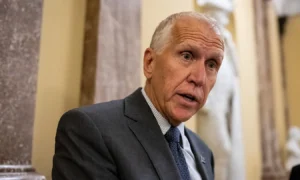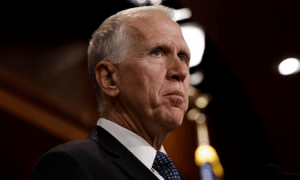Conservatives who want to cut the federal budget are hoping to put President-elect Donald Trump and Elon Musk on their side in January. But last week’s government financing crisis demonstrated that Trump does not always share their fiscal prudence.
Though Trump and Musk helped derail an original bipartisan spending deal despised by fiscal conservatives, 38 House Republicans eventually balked at Trump’s main demand in the next bill: a broader limit on Washington’s borrowing authority.
That decision serves as a reminder that Trump blew up the deficit and authorized billions of dollars in new spending during his first term, two major fiscal issues that House Republicans who opposed last week’s plan claim they want to address.
Following the debt ceiling showdown last week, fiscal rebels, GOP leadership, and Trump appeared to reach a handshake agreement to lift the debt limit next year in exchange for $2.5 trillion in spending cuts. It will be difficult for Republicans to follow through on campaign promises such as improving border security, cutting taxes, and increasing energy production.
For the time being, fiscal conservatives believe Trump is their best shot after losing battle after battle over the last two years.
“We let the bureaucracy develop. We pass CR after CR,” said Arizona Rep. Andy Biggs, who voted against Trump’s spending bill on the floor last week. “That’s going to be where the Trump bully pulpit is going to come in and actually try to deal with some of this stasis, this problem.”
“We’ve never had the level of focused reform that you have coming in,” Rep. Clay Higgins (R-La.) added. “The incoming executive branch is on our side.”
It’s a significant risk for fiscal conservatives. Trump might be effective in pushing for cuts if he wishes, or he could exacerbate the GOP’s existing internal conflicts and generate even more upheaval. And if he does not eventually agree with conservatives on spending priorities, it begs the question of whether those members will engage in a public confrontation with the future president or submit to his wishes.
They aren’t the only ones courting Trump and Musk. Different factions of the conference have their own contacts with the president-elect, and they have clearly tried to persuade Musk to join him on his drive to find big government funding cuts. And Speaker Mike Johnson has been working hard for months to get Trump on his side, with mixed results. Trump may be dissatisfied with Johnson following the spending fight, but he has not publicly chastised him before of the Jan. 3 speaker vote, where Johnson appears to be on thin ice.
“Things will be extremely different around here. This was a critical step to bridge the gap and get us to the point where we can put our fingerprints on the final spending decisions for 2025,” Johnson said immediately after the House passed a package to fund the government with broad Democratic backing.
Other, more centrist Republicans, are supporting the concept of the so-called Department of Government Efficiency, even if they disagree on specifics. Some are actively hoping that Trump would help them subdue their hardliners rather than embolden them.
“I think unified government helps us, because I think President Trump is going to tell some of these guys: ‘Get in line,'” said centrist Rep. Don Bacon (R-Neb.), noting, without naming anyone, that the GOP is also losing some of its most “incendiary” members.
Even appropriators are welcoming outside observers to the federal budget process, as they have their own views for where Trump and his allies should slash spending.
“If this DOGE group really wants to do something, they should look at the mandatory spending, and how we can fix that problem,” said Rep. David Joyce (R-Ohio), referring to a category of government financing that includes Social Security, Medicaid, and Medicare.
However, members of the House Freedom Caucus and others in their corner of the conference have already begun to attempt to persuade Trump’s DOGE leaders in particular. According to three persons who attended the closed-door meeting, they told Musk and his co-leader Vivek Ramaswamy that some of the House Republicans present were the biggest hurdle to revamping spending and the size of the federal government.
Conservatives will also have two significant allies in the midst of the White House budget process: Russ Vought, whom Trump plans to appoint to oversee the Office of Management and Budget, and outgoing North Carolina Rep. Dan Bishop, who is being considered for the No. 2 OMB position.
They are also encouraging Musk and Ramaswamy to undertake a successful public pressure campaign against Republicans who are impeding their efforts, which might backfire. There are early indications that Republican members are already fuming after Musk put uncertainty into the December spending debate. The two guys also suggested developing a “naughty” and “nice” list to help members stay accountable.
“I think what they’re able to do is shine a spotlight on this crap and frankly force Congress to do its job,” said Rep. Chip Roy (R-Texas). “Their primary benefit is going to be [to] expose — if they can highlight the stupid then Congress has to defend the stupid, or they have to get with the program to fix the stupid.”







